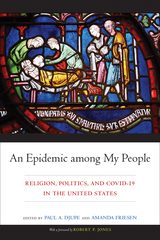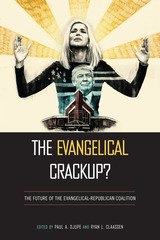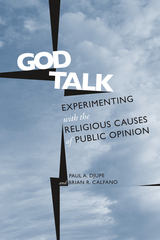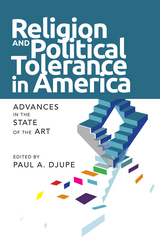
The pandemic presented religion as a paradox: faith is often crucial for helping people weather life’s troubles and make difficult decisions, but how can religion continue to deliver these benefits and provide societal structure without social contact? The topical volume, An Epidemic among My People explains how the COVID-19 pandemic stress tested American religious communities and created a new politics of religion centered on public health.
The editors and contributorsconsider how the virus and government policy affected religion in America. Chapters examine the link between the prosperity gospel and conspiracy theories, the increased purchase of firearms by evangelicals, the politics of challenging public health orders as religious freedom claims, and the reactions of Christian nationalists, racial groups, and female clergy to the pandemic (and pandemic politics). As sharp lines were drawn between people and their governments during this uncertain time, An Epidemic among My People provides a comprehensive portrait of religion in American public life.

Explores a crucial question in American national politics: How durable is the close connection between the GOP and the evangelical movement?

Does religion promote political mobilization? Are individuals motivated by their faith to focus on issues of social justice, personal morality, or both? What is the relationship between religious conviction and partisanship? Does religious identity reinforce or undermine other political identifications like race, ethnicity, and class?
The answers to these questions are hardly monolithic, varying between and within major American religious groups. With an electoral climate increasingly shaped by issues of faith, values, and competing moral visions, it is both fascinating and essential to examine the religious and political currents within America's major religious traditions.
J. Matthew Wilson and a group of prominent religion and politics scholars examine these topics and assess one question central to these issues: How does faith shape political action in America's diverse religious communities? From Pews to Polling Places seeks to cover a rich mosaic of religious and ethnic perspectives with considerable breadth by examining evangelical Christians, the religious left, Catholics, Mormons, African Americans, Latinos, Jews, and Muslims. Along with these groups, the book takes a unique look at the role of secular and antifundamentalist positions, adding an even wider outlook to these critical concerns.
The contributors demonstrate how different theologies, histories, and social situations drive distinct conceptualizations of the relationship between religious and political life. At the same time, however, the book points to important commonalities across traditions that can inform our discussions on the impact of religion on political life. In emphasizing these similarities, the authors explore the challenges of political mobilization, partisanship, and the intersections of religion and ethnicity.

In the series The Social Logic of Politics, edited by Scott McClurg

The essays in Religion and Political Tolerance in America seek to understand how these elements interrelate. The editor and contributors to this important volume present new and innovative research that wrestles with the fundamental question of the place of religion in democratic society. They address topics ranging from religious contributions to social identity to the political tolerance that religious elites (clergy) hold and advocate to others, and how religion shapes responses to intolerance.
The conclusion, by Ted Jelen, emphasizes that religion’s take on political tolerance is nuanced and that they are not incompatible; religion can sometimes enhance the tolerance of ordinary citizens.
READERS
Browse our collection.
PUBLISHERS
See BiblioVault's publisher services.
STUDENT SERVICES
Files for college accessibility offices.
UChicago Accessibility Resources
home | accessibility | search | about | contact us
BiblioVault ® 2001 - 2024
The University of Chicago Press









